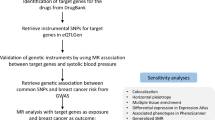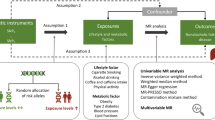Abstract
The UDP-glucuronosylatransferase 1A1 (UGT1A1) gene is involved in the metabolism of estrogen and detoxification of potential carcinogens. The number of TA repeats in the promoter region of UGT1A1 has been linked to breast cancer risk, but results varied by race. We performed a comprehensive assessment of genetic polymorphisms in the UGT1A1 gene, and examined these polymorphisms and TA repeats in relation to breast cancer risk in a case-control study in Nigeria. 512 breast cancer cases and 226 community controls were genotyped for UGT1A1. Compared with high-activity TA repeat genotypes, the odds ratios (OR) for low-activity and moderate-activity genotypes were 0.47 (95% confidence interval CI, 0.26–0.83) and 0.64 (95% CI, 0.39–1.06), respectively, in premenopausal women (P = 0.009 for trend), but no association was observed in postmenopausal women (P = 0.24). The effect of TA repeats was also differentiated by age: the OR was 0.39 (95% CI 0.21–0.71) for low-activity genotypes and 0.58 (95% CI 0.33–1.00) for moderate-activity genotypes in women <45 years old (P = 0.002 for trend), but no association was observed in women ≥45 years old (P = 0.15). Haplotype analysis showed that UGT1A1 haplotypes were highly diverse with blocked structures. We found a specific haplotype in block 2 that was significantly associated with a 2.1-fold elevated risk (95% CI 1.05–4.39; P = 0.04). In contrast with previous studies, we found low-activity TA repeat alleles were protective against breast cancer among premenopausal indigenous Africans, suggesting that the role of UGT1A1 in breast cancer development may vary by population, presumably due to different environmental and genetic modifier effects.

Similar content being viewed by others
References
Tukey RH, Strassburg CP (2000) Human UDP-glucuronosyltransferases: metabolism, expression, and disease. Annu Rev Pharmacol Toxicol 40:581–616
Mackenzie PI, Walter Bock K, Burchell B et al (2005) Nomenclature update for the mammalian UDP glycosyltransferase (UGT) gene superfamily. Pharmacogenet Genomics 15:677–685
Senafi SB, Clarke DJ, Burchell B (1994) Investigation of the substrate specificity of a cloned expressed human bilirubin UDP-glucuronosyltransferase: UDP-sugar specificity and involvement in steroid and xenobiotic glucuronidation. Biochem J 303(Pt 1):233–240
Guillemette C, Millikan RC, Newman B, Housman DE (2000) Genetic polymorphisms in uridine diphospho-glucuronosyltransferase 1A1 and association with breast cancer among African Americans. Cancer Res 60:950–956
Bosma PJ, Chowdhury JR, Bakker C et al (1995) The genetic basis of the reduced expression of bilirubin UDP-glucuronosyltransferase 1 in Gilbert’s syndrome. N Engl J Med 333:1171–1175
Guillemette C, De Vivo I, Hankinson SE et al (2001) Association of genetic polymorphisms in UGT1A1 with breast cancer and plasma hormone levels. Cancer Epidemiol Biomarkers Prev 10:711–714
Shatalova EG, Loginov VI, Braga EA et al (2006) Association of polymorphisms in SULT1A1 and UGT1A1 Genes with breast cancer risk and phenotypes in Russian women. Mol Biol (Mosk) 40:263–270
Adegoke OJ, Shu XO, Gao YT et al (2004) Genetic polymorphisms in uridine diphospho-glucuronosyltransferase 1A1 (UGT1A1) and risk of breast cancer. Breast Cancer Res Treat 85:239–245
Cheng TC, Chen ST, Huang CS et al (2005) Breast cancer risk associated with genotype polymorphism of the catechol estrogen-metabolizing genes: a multigenic study on cancer susceptibility. Int J Cancer 113:345–353
Balram C, Sabapathy K, Fei G, Khoo KS, Lee EJ (2002) Genetic polymorphisms of UDP-glucuronosyltransferase in Asians: UGT1A1*28 is a common allele in Indians. Pharmacogenetics 12:81–83
Innocenti F, Grimsley C, Das S et al (2002) Haplotype structure of the UDP-glucuronosyltransferase 1A1 promoter in different ethnic groups. Pharmacogenetics 12:725–733
Beutler E, Gelbart T, Demina A (1998) Racial variability in the UDP-glucuronosyltransferase 1 (UGT1A1) promoter: a balanced polymorphism for regulation of bilirubin metabolism? Proc Natl Acad Sci USA 95:8170–8174
Hall D, Ybazeta G, Destro-Bisol G, Petzl-Erler ML, Di Rienzo A (1999) Variability at the uridine diphosphate glucuronosyltransferase 1A1 promoter in human populations and primates. Pharmacogenetics 9:591–599
Carey LA, Perou CM, Livasy CA et al (2006) Race, breast cancer subtypes, and survival in the Carolina Breast Cancer Study. JAMA 295:2492–2502
Maitland ML, Grimsley C, Kuttab-Boulos H et al (2006) Comparative genomics analysis of human sequence variation in the UGT1A gene cluster. Pharmacogenomics J 6:52–62
Carlson CS, Eberle MA, Rieder MJ et al (2004) Selecting a maximally informative set of single-nucleotide polymorphisms for association analyses using linkage disequilibrium. Am J Hum Genet 74:106–120
Stephens M, Donnelly P (2003) A comparison of bayesian methods for haplotype reconstruction from population genotype data. Am J Hum Genet 73:1162–1169
Patil N, Berno AJ, Hinds DA et al (2001) Blocks of limited haplotype diversity revealed by high-resolution scanning of human chromosome 21. Science 294:1719–1723
Zhang K, Jin L (2003) HaploBlockFinder: haplotype block analyses. Bioinformatics 19:1300–1301
Rubin DB (1987) Multiple imputation for nonresponse in surveys. Wiley, New York
Hong AL, Huo D, Kim HJ et al (2007) UDP-glucuronosyltransferase 1A1 gene polymorphisms and total bilirubin levels in an ethnically diverse cohort of women. Drug Metab Dispos 35:1254–1261
Sparks R, Ulrich CM, Bigler J et al (2004) UDP-glucuronosyltransferase and sulfotransferase polymorphisms, sex hormone concentrations, and tumor receptor status in breast cancer patients. Breast Cancer Res 6:R488–R498
Stocker R, Yamamoto Y, McDonagh AF, Glazer AN, Ames BN (1987) Bilirubin is an antioxidant of possible physiological importance. Science 235:1043–1046
Grant DJ, Bell DA (2000) Bilirubin UDP-glucuronosyltransferase 1A1 gene polymorphisms: susceptibility to oxidative damage and cancer? Mol Carcinog 29:198–204
Ching S, Ingram D, Hahnel R, Beilby J, Rossi E (2002) Serum levels of micronutrients, antioxidants and total antioxidant status predict risk of breast cancer in a case control study. J Nutr 132:303–306
Haiman CA, Hankinson SE, De Vivo I et al (2003) Polymorphisms in steroid hormone pathway genes and mammographic density. Breast Cancer Res Treat 77:27–36
Indap AR, Marth GT, Struble CA, Tonellato P, Olivier M (2005) Analysis of concordance of different haplotype block partitioning algorithms. BMC Bioinformatics 6:303
Author information
Authors and Affiliations
Corresponding author
Rights and permissions
About this article
Cite this article
Huo, D., Kim, HJ., Adebamowo, C.A. et al. Genetic polymorphisms in uridine diphospho-glucuronosyltransferase 1A1 and breast cancer risk in Africans. Breast Cancer Res Treat 110, 367–376 (2008). https://doi.org/10.1007/s10549-007-9720-7
Received:
Accepted:
Published:
Issue Date:
DOI: https://doi.org/10.1007/s10549-007-9720-7




